‘Succession’ Director Mark Mylod on How Long That Death Was in the Works and How Episode 3 Almost Ended
- Oops!Something went wrong.Please try again later.
- Oops!Something went wrong.Please try again later.
- Oops!Something went wrong.Please try again later.
- Oops!Something went wrong.Please try again later.
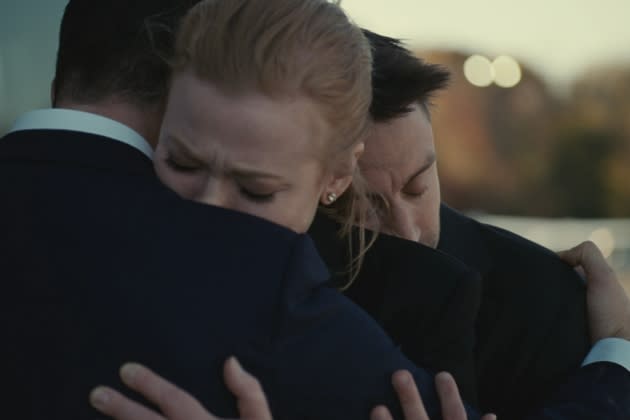
SPOILER ALERT: This interview discusses gargantuan plot developments in “Connor’s Wedding,” Season 4, Episode 3 of “Succession,” now streaming on HBO Max.
Many devotees of “Succession” assumed that sometime during its final season, the show’s patriarch Logan Roy — a businessman of unparalleled brilliance, and a churlish father, who loves his children (despite all evidence to the contrary) — would die. After all, Logan, played by Brian Cox, had a stroke in the 2018 series premiere of HBO’s Emmy-winning drama, and his ill-health has been an ongoing concern.
More from Variety
But Logan dying in Episode 3?! A total shock to “Succession” nation.
“Connor’s Wedding,” written by “Succession” creator Jesse Armstrong, and directed by executive producer Mark Mylod, has two main settings: a boat on which Connor Roy (Alan Ruck) and his siblings Kendall (Jeremy Strong), Roman (Kieran Culkin) and Shiv (Sarah Snook) are gathered, and the Waystar Royco plane, where Logan is flying with his executive team to Sweden, in order to try to salvage the GoJo deal.

As can happen with sudden tragedies during the age of cellphones, the news of what’s happened on the plane — where Logan has collapsed, and is receiving (likely futile) treatment — travels to the boat in a staccato, deficient and maddening manner, with Tom (Matthew Macfadyen), Shiv’s estranged husband, serving as the medical event’s ill-equipped messenger.
“Connor’s Wedding” is simultaneously propulsive, with a real-time vibe, and heartbreakingly emotional — as Logan’s kids veer wildly through their grief.
The day after the episode aired, Mylod spoke with Variety about directing “Connor’s Wedding.” He revealed that Logan’s death had been in the works since before the show’s third season, how he filmed the boat scenes in which the Roys are dealing with the tsunami that is Logan’s death, that unscripted hug among the siblings — and what the episode’s final image nearly was.
When did Jesse Armstrong first tell you that Logan would be dying this season?
It was way back when we were doing Season 3 — I think we were in pre-production for Season 3. That’s when he first told me about this idea, that it should happen early in the season in an episode slot that you would not necessarily expect, and this idea of actually creating, hopefully, great drama out of mundanity — you know, the inconvenience of it all. Which just seemed wonderful to me.
We went to HBO, and chatted with Casey [Bloys] and Francesca [Orsi] and Nora [Skinner] and the gang there — and they were incredibly supportive.
But there was a lot of trepidation. Brian is an incredible actor, and this is an incredibly powerful character in modern television drama. Not to over-aggrandize ourselves, but he’s got a lot of heft. So it’s a huge and scary choice to actually kill off that character.
Was it always going to be that he died off camera? Was there ever a scenario in which we would have seen it, or at least the lead up to it?
I’m sure when Jesse was imagining it, he went through a number of scenarios. But once it landed on this idea of the inconvenience of it — the lack of drama, if you like — it just felt so real. With a sudden death in the modern age, it’s a phone call or a text, or even an email. It isn’t a Shakespearean death scene.
In terms of the structure of how we handle and tell the story of this huge character’s death, it just seems so interesting and fresh to focus on the frustration of trying to get the information. Our story revolves around a media empire; it revolves around information and eyeballs. And this idea of the irony of not being able to get that information, apart from the wonderful device of putting the audience somewhat into the heads of the characters and their frustration of: “Is this really happening? What’s happening, what’s happening?”
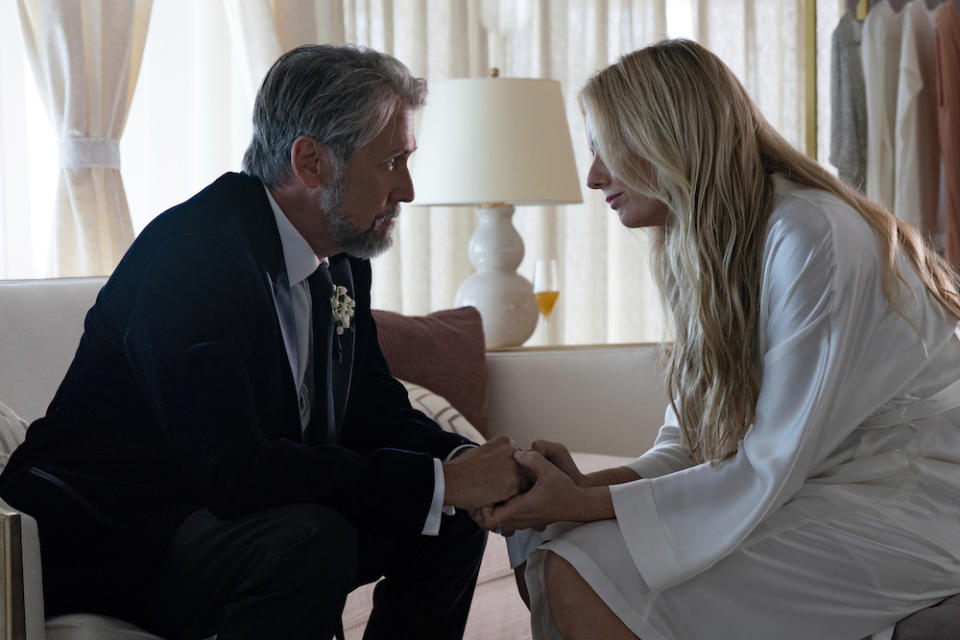
Given all of that, how did you decide what your overall visual approach would be, with the kids at Connor’s wedding, and the other characters on the plane?
With the treatment of the siblings on the boat, it seemed very apparent to me very quickly — immediately, really — on reading that, that the camera needed to be a sadist. That it needed to stick the lens right in those poor people’s faces. In the worst kind of paparazzi style of, find the people that are in the most pain, and stick a lens right in their face. And don’t take it away — try to keep it there as long as possible, to be as unflinching as possible. It felt really cruel. But it also felt like exactly the right thing to do.
And that’s what we tried to do. We tried — once they’ve got the news, and they’re trying to seek clarity and information on it — to keep the cameras right in their faces as much as possible, for as long as possible. The challenge there was really that we shoot on 35mm film, and therefore it runs out after 10 minutes. We shoot with two cameras. And after shooting in those chunks through those moments, there was a whole half-hour chunk of real-time story, from the moment that the characters first go upstairs and the call comes in from Tom, through to Kendall going outside and talking to Frank, where it felt like it had to be literally real-time.
Wow, OK.
So I talked to the cast and the crew about, “Is there a way we can do this? Can we do a half-hour unbroken take?” And that’s what we did. The actors were up for it. The camera team were brilliant, in that we basically hid camera magazines all over the place, and a third camera body tucked behind the door, so that at least one camera could be running all the time, whilst the other camera was literally running to do a super-fast reload, and start shooting again.
We ended up with this extraordinary ballet between the cast and the camera crew, as the cast just kept going, kept going, kept going, kept going over this half-hour period, whilst the crew were dancing around them to cover it. And the results were — well, you see the results, if you’ve seen the episode. There is an intensity to it. And a huge chunk of that take is what made the final cut.
That was the approach on the boat, which was a section we shot first, over a week or so. And then in shooting on the plane, the idea initially was that we would see very little — very, very little — of Tom during that initial section, before we get into the post-compressions forensic element. But Matthew was so damn compelling that we ended up actually having a fantastic dilemma in the edit, trying to get the balance right in the intercut between the two locations. We ended up using a lot more of Matthew on camera than we originally intended. That was a happy dilemma.
Wait, so Matthew was always going to be on the phone with them. But you didn’t realize how much of him you’d be showing?
Exactly right, yes. It had been written with this idea that we would always hear Matthew’s voice. And when we were shooting on the boat, Matthew was always there on the phone. He was actually in London at the time — the poor man was with us until two o’clock in the morning sometimes. That’s his voice, obviously, live coming out of the phone in the moment.
And when we get onto the plane, the rest of the cast, the other siblings, were there off-camera for him to give him the kind of quid pro quo back. That’s our creed — that they’ll be there to support each other. But yeah, we ended up using a lot more of him actually, on camera than we originally expected.
The other odd, unexpected dilemma, just in photographic grammar, was how much or how little to show of Brian’s character, of Logan, prostrate. Instinctively, it felt oddly disrespectful. And I wasn’t sure if that was just me being queasy, or whether it was right to fight against that instinct. It became a point of discussion, chatting to Jesse about it, and he felt exactly the same as I did. When both of us agree, I feel that there’s probably a decent consensus there.
So we moved forward with that, and we just showed Brian’s face, or Logan’s face, just the one time in what I hope is quite a poignant scene of the phone being up against his ear, and the hopelessness of Shiv trying to trying to reach him, trying to talk to him, whilst the heart compressions continue.
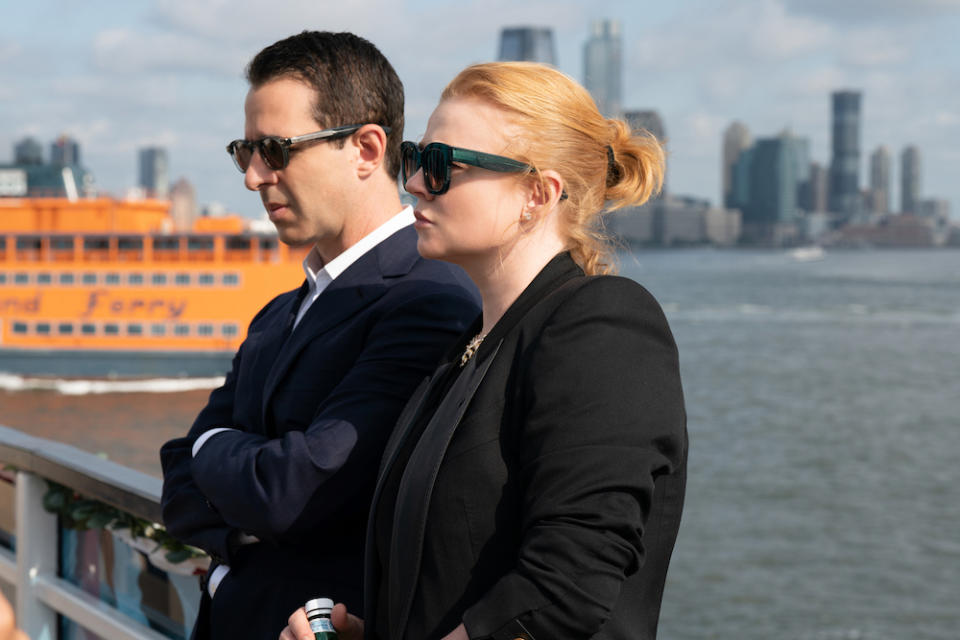
What were the logistics of that? Was it a dummy, or a double? Was it … Brian?
I didn’t want to ask Brian. It’s already incredibly emotional for Brian, rather than to ask him to lie down and play dead for a couple of weeks, or a few days. I didn’t ask him to do that. Getting into the real machinations of it, 90% of the time, it was a stunt double down there. We needed a stunt double, because we had to, obviously, have all these heart compressions, so we needed somebody who could handle having their chest compressed pretty much all day. And it was brilliant stunt performer who helped us with that. Sometimes the camera would skim over his torso a little.
That one shot where you see of Brian laying on the floor, whilst the heart compressions continue, is actually a composite shot. It’s actually the stunt double’s torso, because I wanted the compressions to continue safely, and Brian’s head. We stuck them together in post, and then put some rhythmic action onto Brian’s head to match it.
Brian’s obviously in a few scenes at the beginning of the episode. How was he feeling shooting those final scenes, and what was that like?
How he felt is obviously up to him to express. For all of us, it was very sad. Particularly the reality check when we came to do the table read for his last episode, where we’re all gathered together, and we read the scene through in real time. That’s when it really hit us — that this would be the last table read that we had with him. And then, it was the last scene that we would do with him.
Luckily, we’d already put into motion an idea: that in order to try to preserve the secret of this episode, that Brian would be around for subsequent episodes. And would even appear in a much later episode, so that we would see him down the line, and hopefully try to head off rumors that the character had died. So he was always around.
But in terms of being on set and actually playing Logan — yeah, we were just really sad. And I’m damn sure Brian was too.
Is that a flashback episode in a future episode?
No, not a flashback. No, the stuff in a subsequent episode, we basically bring him on to shoot dummy scenes — scenes that didn’t actually exist. As a misdirect.
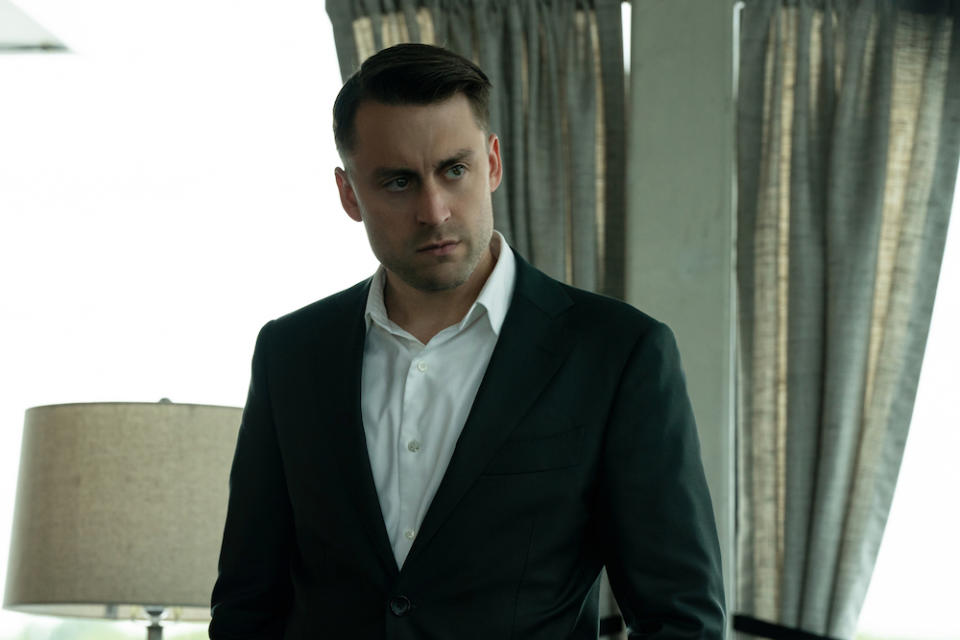
Oh, I see! With the plane, was that a set that you were filming on?
Yeah, it became apparent after Season 1, that we were going to be spending quite a lot of time on the main Waystar jet. Financially, it was a smart thing to do to build the fuselage in a soundstage. So that’s what we did.
It feels so claustrophobic that whole time, when usually, it feels pretty luxurious. With an emergency happening, less so. What were the challenges of that?
It sounds oddly macabre, but I really enjoyed it. Because both with the airplane shoot and on the boat, there was such a closeness to our company. If ever we felt like an old theater rep company, it was then. We all knew we were shooting the last season anyway, so there was such a closeness to all the cast that I really felt that throughout the process. There was a real happiness to that, oddly.
In terms of shooting, of structuring the airplane stuff, the first thing to do was to get the mise-en-scène correct, and that meant researching exactly what the process would be if somebody on a private jet had a heart attack or had heart failure — what would they do? And so we spoke to various consultants, and had a demonstration as to how to use a defibrillator, etc. You fall back on reality at every time, and authenticity. It just falls into authenticity. And that’s always been our kind of obsession.
How long did you have to film the episode?
No longer than a standard episode: I think it was maybe 12 or 13 days. Technically, it wasn’t a hard episode. The slight contradiction is on the one hand, we’re shooting big chunks, because I wanted this flow of performance, so we’re shooting a lot of pages in one day. On the other hand, we have to shoot a lot of those pages twice — in we have to shoot pages 10 through 40 on the boat, and then we have to shoot pages 10 through 40 on the plane for the other side.
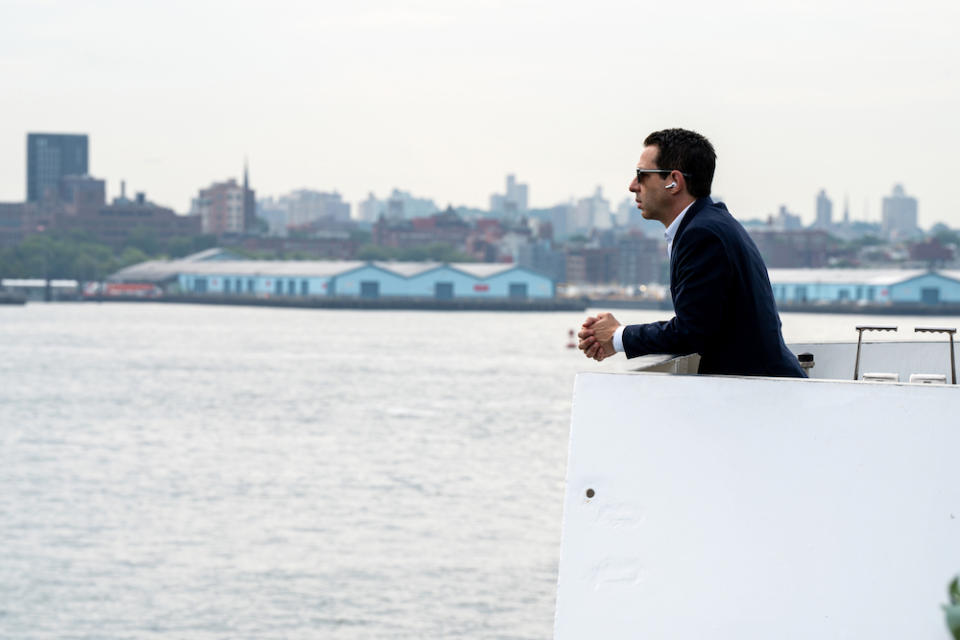
“Succession” isn’t often a tearjerker. But this episode was so emotional — I cried so much! Were you feeling that when you were directing it?
Oh, goodness, yes. The first time with Sarah on the call to her dad, Jesse and I were in bits after that first take. Really, she just nailed it in a way that only Sarah can. That was extraordinary.
And again, when we went up to the airport in Westchester to shoot the three siblings doing the press call: That lovely unscripted, three-way hug between them, which I thought was really beautiful, they just fell into.
Oh! That wasn’t in the script?
No. They just fell into each other there, which was just gorgeous. And then the separation of the three characters, Sarah going that way, and Shiv wanting or needing the support of Tom in that moment, despite everything. Roman feeling the need to go on to the plane to see his father’s body, and leaving Kendall alone there — I found that tremendously poignant. That was an incredibly busy day shooting. But it was a very, very emotional for all of us.
How did you decide what the final shot would be? That it would be on Kendall, with Jeremy Strong reacting as Logan’s body comes off the plane.
It was scripted that way, which sometimes makes it easy, sometimes doesn’t, as in the case of the Season 3 finale where we couldn’t quite find it, and so we had to improvise beyond that to find it. In this case, as always, we shot quite a way beyond that, because I just never say cut unless the film’s rolled out. That was the scripted moments of him watching as the body came down, almost verbatim. But because they were in the moment, Jeremy’s character, in some takes, really fell apart emotionally, in some takes was more stoic. We chose a more stoic take. It just felt right with the balance.
But he walked over to his car, to his driver, as Roman was coming back from the aircraft, and shared a look before the two of them got into their respective cars, and the cars drove away. As the cars drove away, the camera just landed on the ambulance, which then drove away. And all the vehicles kind of — oddly, like the end of “Ocean’s 11” — all the players exited the stage, to leave us just with this blank runway. Which was very powerful.
But ultimately, the more personal close-up of Jeremy’s lovely performance there, with the moon rising behind him, that just felt like the moment to cut to black.
HBO tells me that you directed four episodes this season. Mark, what’s it been like for you to say goodbye to “Succession”?
Oh really, very, very, very, very emotional. I stayed with “Game of Thrones” for three seasons, “Shameless” for three, “Entourage” for three — I’m a commitment addict. I tend to stick around with these characters, and saying goodbye to this after four seasons was really hard. The last couple of weeks, the way the ambush kind of randomly hijacks you, when you’re not expecting it.
There was one day towards the end of the season when I just could barely operate. I was just so damn sad — and shocked. And I’m still getting to grips with it. Luckily, I’ve got the comfort of post-production to keep me going. But really, unbelievably sad.
This interview has been edited and condensed.
Best of Variety
Sign up for Variety’s Newsletter. For the latest news, follow us on Facebook, Twitter, and Instagram.

